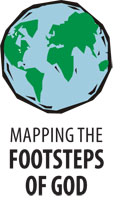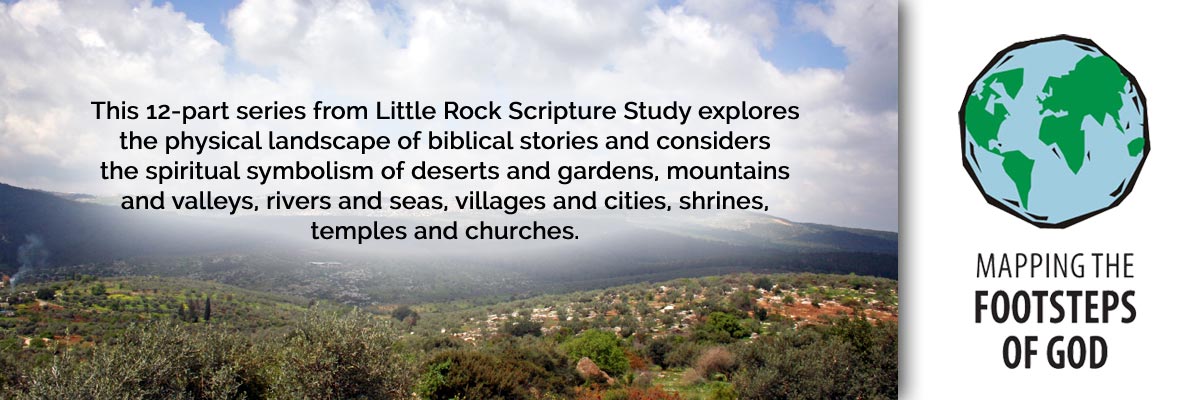Official Website of the
Catholic Diocese of Little Rock
God encounters us in desert's bareness
Published: February 15, 2014
This is the second column in a 12-part series
By Clifford M. Yeary
Associate Director, Little Rock Scripture Study
In Genesis 3:8-9 we read of God walking in the Garden of Eden, enjoying the cool afternoon breeze, searching for the humans he created. This simple, "down to earth" theology conveys a profound, timeless reality. God hopes to encounter us in and through the world created to be our home. In Genesis, our first home is a paradise. We know, though, from that early encounter with God that we, because of our sinfulness, can no longer call paradise our earthly home.
 In our world, along with some florid, peaceful gardens, there are now many deserts. Deserts are places ill-suited for humans unprepared to deal with their extreme geographical features. They lack water, so vegetation is sparse and the creatures that dwell in them are often predatory and poisonous. Our deserts can be literal or metaphorical, but in the Bible we learn they can be the very places where God finally finds us and calls us back to life in him.
In our world, along with some florid, peaceful gardens, there are now many deserts. Deserts are places ill-suited for humans unprepared to deal with their extreme geographical features. They lack water, so vegetation is sparse and the creatures that dwell in them are often predatory and poisonous. Our deserts can be literal or metaphorical, but in the Bible we learn they can be the very places where God finally finds us and calls us back to life in him.
In the Bible, many passages speak of literal deserts and wildernesses, but desert images are also often employed as an opportunity to reflect on our relationship to God. The desert regions of greatest importance in Scripture are the Sinai to the south in Egypt, the Judean wilderness in west central Judah, and the Arabian desert to the east separating Judah from Babylon.
The dangers deserts present to human survival can be a warning of what life becomes when God is evicted from our lives. The desert can be a sign of punishment awaiting rebels (Psalm 68:7). It can be a symbol of the result of neglectful leadership (Jeremiah 12:10-11) as well as a warning sign of divine judgment (Isaiah 32:11-16).
Deserts can also invite deep reflection on spiritual realities. As the lushness of the material world is stripped from our senses by the barrenness of a desert, we might turn our hearts toward God and seek to discover what is truly important in our lives.
Following the Exodus from Egypt, Moses led the people of Israel as they wandered in the desert (chiefly in the Sinai Peninsula). Their situation is ambiguous as they grumble and complain against Moses: "If only we had died at the Lord's hand in the land of Egypt, as we sat by our kettles of meat and ate our fill of bread! But you have led us into this wilderness to make this whole assembly die of famine!" (Exodus 16:3). And yet God cares for them and nourishes them on quail, with manna from heaven and with water from a rock (Exodus 16:4, 13; 17:6).
In Deuteronomy 32:10 God is said to have found his people in the desert: "He found them in a wilderness, a wasteland of howling desert. He shielded them, cared for them, guarded them as the apple of his eye." Centuries later, when the people of Judah are driven into exile in Babylon, God calls on them to return to their homeland and the wilderness that separates them from Jerusalem is now to be understood as a pathway back to their God: "A voice proclaims: In the wilderness prepare the way of the Lord! Make straight in the wasteland a highway for our God!" (Isaiah 40:3.)
In the New Testament, the Judean desert becomes a place for a significant encounter between the Jewish people and the prophet known as John the Baptist. Once again we encounter the dualistic symbolism of the desert. It is a place of warning as well as the locale of a spiritual encounter. "Who warned you to flee from the coming wrath?" he asks the Pharisees and Sadducees that come out to him, but many of the people seek his baptism in repentance of their sins (Matthew 3:1-9).
Most important of all those who came out to John is Jesus, who was revealed as the Son of God after being baptized by John. Matthew, Mark and Luke all record that Jesus, immediately after being baptized, went into the desert to fast and pray for 40 days where he was also tempted by the devil. After rejecting temptation, this desert became the place of renewal, as angels came to minister to him there (Matthew 3:13–4:11).
The deserts of our lives are undoubtedly troubling places of both temptation and doubt, but they can also be the occasion for deep spiritual renewal.
Study Questions
- What are some geographical deserts you have visited? What were your impressions of them?
- Describe a time in your life that felt like a desert. Did you find your desert experience to be both a time of struggle and a time of renewal?
- What biblical story involving a desert is most vivid to you? Why does it stand out?
- Why do you think God uses deserts to call people back to himself?
This article was originally published in Arkansas Catholic Feb. 15, 2014. Copyright Diocese of Little Rock. All rights reserved. This article may be copied or redistributed with acknowledgement and permission of the publisher.




